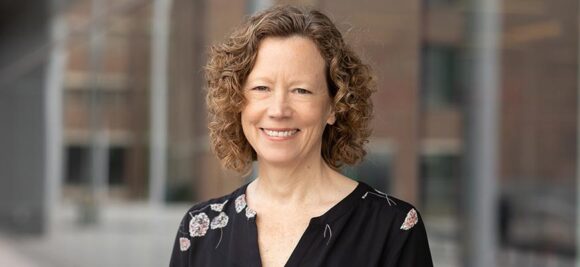From Rutgers Gardens and Helyar Woods to the Rutgers University Marine Field Station, Rutgers University-New Brunswick’s School of Environmental and Biological Sciences makes full use of its resources around the Garden State to serve as living labs for students and the public, according to the school’s new interim executive dean.
“SEBS is on the front lines of addressing community, environmental and health issues,” said Laura Lawson. “For our very dedicated students, we’re working to instill not just pride in that, but an experience-based connection to what we do. You can talk to a student about permeable pavement or pollinator plants. But when they can see and touch these systems with all their beauty and challenges, or when they work in the Chrysler Herbarium or Rutgers Ecological Preserve, or launch robotic ocean gliders as part of our Center for Ocean Observing Leadership, they gain a tangible understanding that will help launch their careers.”
Lawson said this type of hands-on learning is a challenge while remote learning is used during the pandemic, but faculty and staff are developing creative alternatives such as the WeRSEBS At Home campaign that used instructional videos, images and live sessions on Instagram to connect with students on topics of Gardens and Landscapes; Health and Wellness; Community Service; and Sustainability.
The passion for fostering student involvement in projects that benefit their surrounding communities is one that Lawson has applied since she joined Rutgers in 2010 as chair of the Department of Landscape Architecture, and in her subsequent leadership roles. As dean of Agriculture and Urban Programs and later as dean of Academic Programs, she led the expansion of urban engagement through new programs and community-based research and teaching.
Chancellor Christopher J. Molloy appointed Lawson as interim executive dean of SEBS and director of the New Jersey Agricultural Experiment Station, effective July 1, after her predecessor Robert M. Goodman decided to step down as SEBS’ 10th dean. Goodman recruited Lawson to her first Rutgers position and recommended her as his replacement.
“Dr. Lawson has made significant contributions to SEBS, including development of campus living labs, improving the student experience, enhancing out-of-state and international undergraduate recruitment and contributing to the school’s strategic planning process. She has also helped expand SEBS’ urban engagement through new programs and academic community-based research and teaching. I am confident that she will continue to ably lead SEBS and NJAES in the months ahead,” Chancellor Molloy said.
Goodman said, “Dr. Lawson’s great understanding of governance, combined with her background as a leader of landscape architecture projects that engage communities, are perfectly suited to bring SEBS into the future.”
Lena Struwe, director of the Chrysler Herbarium and professor of evolution, botany and plant systematics, described Lawson’s approach as “the opposite of an ivory tower. She has a real enthusiasm for projects that serve our students while making a real, visible impact on the campus and on society and that overcome barriers between the university and our communities.”
Before joining Rutgers, Lawson was an associate professor at the University of Illinois-Urbana-Champaign, and previously served as a landscape architect on projects that involved working with communities to develop open space that responded to their particular needs. In Berkeley, for instance, she worked with residents and a local youth organization to transform a half-acre abandoned railroad corridor into an organic food producing garden, which also provided youth training and employment. She is currently collaborating on a multi-media project that builds knowledge and networks celebrating the rich personal, cultural, and economic roles agriculture has played in rural and urban African American communities.
Referring to her community-based scholarship, Lawson said, “I am bringing a similar mindset to SEBS and the New Jersey Agricultural Experiment Station. We have a strong community and are finding the best ways to build on our very successful work of connecting environmental sustainability with human wellness. This is especially challenging during a pandemic, but I’m proud of the enthusiasm that our faculty and students are bringing to the challenge.”
Editor’s Note: this article originally appeared in Rutgers Today.


